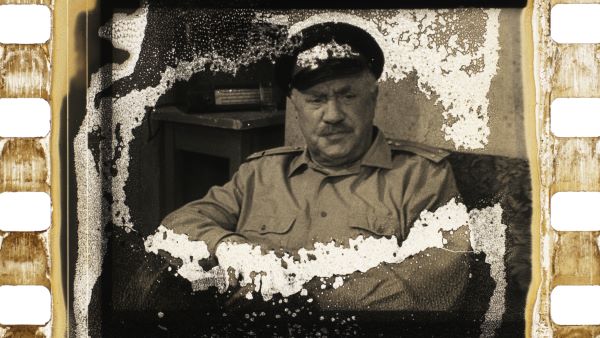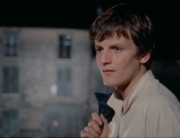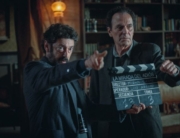
This new work from Bill Morrison would not have existed had an Icelandic fishing boat not discovered four reels of 35mm film underwater. This is not his first film with such an origin: Dawson City: Frozen Time was built around long-lost footage from the early 1900s, which provided a record of the early days of the Canadian Gold Rush. In that case, the film reels were preserved with the aid of permafrost. In the matter of The Village Detective: A Song Cycle, it was hydrogen sulfide from the ocean floor. Yet the discovery, the second time around, was, in fact, a copy of a fairly well-known Soviet film, starring Mihail Žarov, a famous actor of his day.
If there is a thread here, it is Žarov and his extensive filmography, yet this is no straightforward documentary. While there is occasional narration, and an occasional talking head, we are left mostly with both abstract and representational animation (usually of the ocean), archival footage, and excerpts from Žarov’s old films. Sometimes these excerpts are presented without much fuss except the intrusion of on-screen narration; others are heavily animated over in jerky streaks of brown or blue that suggest the damaged quality of old footage. While The Village Detective itself—the film that was found underwater—is the one movie that appears again and again, we see others from all points of Žarov’s career. Some of them feature him as a young man playing supporting characters, and one as an old man. Additional sequences explore how the film was preserved and, briefly, what drew the director to it.
Chief among the ideas explored is the passage of time. It is remarkable, we are given to believe, that these reels managed to survive, that it is possible to trace Žarov’s career over such a great span of time, that these old stories could, perhaps, have something to say to us now. Through the collection of footage and the various animated effects, and through seeing Žarov at so many different ages and in so many different incarnations, there is an expression of endurance when faced with the eroding pressures of time.
Yet, truth be told, the above is a little too generous to Morrison’s film. Certainly, there are intriguing bits of information and animated sequences, and the bits of old footage are not un-entertaining to watch. Still, the filmmaker fails to endow his found footage, and Žarov himself, with much significance. In the press notes, Morrison admits that the Soviet-made The Village Detective is not an especially good film, and more than once we hear that Žarov was not an especially good actor (unless he was in the hands of someone like Eisenstein). The footage we see confirms that neither are remarkable, and the question remains as to why we are watching.
One is left ultimately with the sense that Morrison failed to find a subject that could sustain his meditations. Those looking for something with more layers should return to Dawson City: Frozen Time.
















Leave A Comment